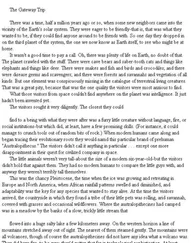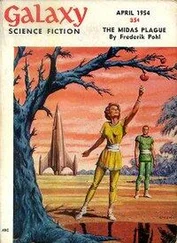Pohl, Frederik - The Age of the Pussyfoot
Здесь есть возможность читать онлайн «Pohl, Frederik - The Age of the Pussyfoot» весь текст электронной книги совершенно бесплатно (целиком полную версию без сокращений). В некоторых случаях можно слушать аудио, скачать через торрент в формате fb2 и присутствует краткое содержание. Жанр: Старинная литература, на английском языке. Описание произведения, (предисловие) а так же отзывы посетителей доступны на портале библиотеки ЛибКат.
- Название:The Age of the Pussyfoot
- Автор:
- Жанр:
- Год:неизвестен
- ISBN:нет данных
- Рейтинг книги:4 / 5. Голосов: 1
-
Избранное:Добавить в избранное
- Отзывы:
-
Ваша оценка:
- 80
- 1
- 2
- 3
- 4
- 5
The Age of the Pussyfoot: краткое содержание, описание и аннотация
Предлагаем к чтению аннотацию, описание, краткое содержание или предисловие (зависит от того, что написал сам автор книги «The Age of the Pussyfoot»). Если вы не нашли необходимую информацию о книге — напишите в комментариях, мы постараемся отыскать её.
The Age of the Pussyfoot — читать онлайн бесплатно полную книгу (весь текст) целиком
Ниже представлен текст книги, разбитый по страницам. Система сохранения места последней прочитанной страницы, позволяет с удобством читать онлайн бесплатно книгу «The Age of the Pussyfoot», без необходимости каждый раз заново искать на чём Вы остановились. Поставьте закладку, и сможете в любой момент перейти на страницу, на которой закончили чтение.
Интервал:
Закладка:
“Positively not!” Forrester was both startled and indignant. “What do you mean, somebody was after me? I had no idea—”
Then, tardily, recognition dawned. “Unless,” he finished thoughtfully, “that’s what the joymaker was mumbling about. It was all about bonds and guaranties and somebody named Heinz something of Syrtis Major. That’s on Mars, isn’t it? Say!”
“Heinzlichen Jura de Syrtis Major,” Hara supplied, toasting Forrester with his glass and taking a tiny sip of the drink. Forrester followed suit; it was champagne again. Hara sighed and said, “I don’t know, Charles, but I don’t think I’ll acquire a taste for this stuff after all.”
“Never mind that! The Martian! The fellow in orange tights! He’s the one who beat me up, he and his gang!”
Hara looked faintly puzzled. “Why, of course.”
Forrester tipped up his ruby crystal glass and drained the champagne. It was not very good champagne—heaven knew where Hara had found it, after Forrester had mentioned it as being one of the great goods of the past—and it was by no means appropriate to the occasion. It tickled his nose. But at least it contained alcohol, which Forrester felt he needed.
He said, humbly, “Please explain what happened.”
“Sweat, Charles, where do I start? What did you do to Heinzie?”
“Nothing! I mean—well, nothing, really. I might have stepped on his feet when we were dancing.”
Hara said angrily, “A Marsman? You stepped on his feet?”
“What’s so bad about that? I mean, even if I did. I’m not sure I did. Would you blow your stack about something like that?”
“Mars isn’t Shoggo,” Hara said patiently, “and, anyway, maybe I would. Depends. Did you read your orientation book?”
“Huh?”
“The book of information about the year 2527. You got it when you were discharged here.”
Forrester searched his memory. “Oh, that. Maybe I left it at the party.”
“Well, that adds,” Hara said with some disgust. “Will you please try to bear in mind, first, that you’re sort of my responsibility; second, that you don’t know your way around? I’ll see you get another copy of the book. Read it! Come back and see me tomorrow; I’ve got work to do now. On your way out, stop at the discharge office and pick up your stuff.”
He escorted Forrester to the door, turned, then paused.
“Oh. Adne Bensen sends regards. Nice girl. She likes you,” he said, closed the door, and was gone.
Forrester completed his processing and was released by the medical section, receiving as he left a neat white folder with his name imprinted in gold.
It contained four sets of documents. One was a sheaf of medical records; the second was the book Hara had mentioned, slim and bronze-bound, with the title printed in luminous letters:
YOUR GUIDE TO THE 26 THCENTURY [1970-1990 EDITION]
The third document seemed to be a legal paper of some kind. At least, it was backed with a sheet of stiff blue material that gave it the look of a subpoena. Forrester remembered that the doctor who had patched him up had spoken of trouble. This looked like the trouble, though the words were either unfamiliar in context or totally meaningless to him:
You, Charles Daigleish Forrester, uncommitted, undeclared, elapsed thirty-seven years, unemployed-pending, take greeting and are directed. Requirement: To be present at Congruency Hearing, hours 1075, days 15, months 9 . . .
It had the authentic feel of legalese, he saw with dismay. Much of the face of the single sheet of paper that the blue material enclosed was covered with a sort of angular, almost readable lettering—something like the machine script they used to put on checks, Forrester thought, and then realized that that was no doubt what it was.
But the paper had a date on it, and since that date appeared to be a week or more away, as near as Forrester could figure, he tabled it with some relief and turned to the next and last item in the folder.
This was a financial statement. Attached to it was a crisp metallic slip with the same angular printing on it, which Forrester recognized as a check.
He fingered it lovingly and puzzled out the amount.
It was made out to him, and it was for $231,057.56.
Forrester attempted to fold it—it sprang back like spring steel—and then put it away flat in his pocket. It felt good there.
He was faintly puzzled by the fact that it was some twenty thousand dollars less than he had expected. But in terms of percentage the amount didn’t seem very significant, and he was cheerfully reconciled to the opinion that this society, like all societies, would no doubt have some sort of taxes. Twenty grand was, after all, an amount he could well afford as a sort of initiation fee.
Feeling much more secure, he emerged into the sunlight and looked about him.
It was late afternoon. The sun was to his right. Slate-blue water stretched to his left. He was looking southward over the great pinnacled mass of the city.
Aircraft moved above it. Things crawled in its valleys. The sun picked out reflections from glass and metal, and, although it was still daylight, the city already exuded a developing glow of neon and fluorescence.
There were at least ten million people in Shoggo, Forrester knew. There were theaters and card parties and homes, places where he might find a friend or a lover. Or even an enemy. Down there was the girl who had kissed him last night—Tip?—and the crazy Martian and his gang, who had tried to kill him.
But where?
Forrester did not know where to begin.
Alive, healthy, with almost a quarter of a million dollars in his pocket, he felt left out of things. Standing on a planet with a population of seventeen billion active human beings, and at least twice that number dreaming in the slow cold of the helium baths, he felt entirely alone.
From his belt the voice of the joymaker spoke up. “Man Forrester. ‘Will you take your messages?”
“Yes,” said Forrester, disconcerted. “No. Wait a minute.”
He took the last cigarette out of the pack he had got that morning, lit it, then crumpled the pack and threw it away. He thought.
Owning a joymaker was a little like having a genie with three wishes. The thing’s promptness and precision disconcerted him; he felt that it demanded equal certitude from himself and he did not feel up to it.
He grinned to himself ruefully, admitting that he was being made self-conscious by what he really knew to be nothing but a radio connection with some distant lash-up of cold-state transistors and ferrite cores. Finally he said, “Look. You. I think what I ought to do is go back to my room and start over again from home base. What’s the best way to get there?”
“Man Forrester,” said the joymaker, “the best way to get to the room you occupied is by cab, which I can summon for you. However, the room is no longer yours. Will you accept your messages?”
“No. Wait a minute! What do you mean, no longer mine? I didn’t check out.”
“Not necessary, Man Forrester. It is automatic on departure.”
He paused and thought, and on consideration it didn’t seem to matter much. He had left nothing there. No bag, no baggage. No personal possessions, not even a shaving brush: he wouldn’t have to shave for a week or two anyway, Hara had told him.
All of himself that he had left in the room was the garments he had worn last night. And those, he remembered, were disposable . . . and so had no doubt been disposed of.
“What about the bill?” he asked.
“The charge was paid by the West Annex Discharge Center. It is entered on your financial statement, Man Forrester. Your messages include one urgent, two personal, one notice of legal, seven commercial—”
“I don’t want to hear right now. Wait a minute.”
Читать дальшеИнтервал:
Закладка:
Похожие книги на «The Age of the Pussyfoot»
Представляем Вашему вниманию похожие книги на «The Age of the Pussyfoot» списком для выбора. Мы отобрали схожую по названию и смыслу литературу в надежде предоставить читателям больше вариантов отыскать новые, интересные, ещё непрочитанные произведения.
Обсуждение, отзывы о книге «The Age of the Pussyfoot» и просто собственные мнения читателей. Оставьте ваши комментарии, напишите, что Вы думаете о произведении, его смысле или главных героях. Укажите что конкретно понравилось, а что нет, и почему Вы так считаете.












